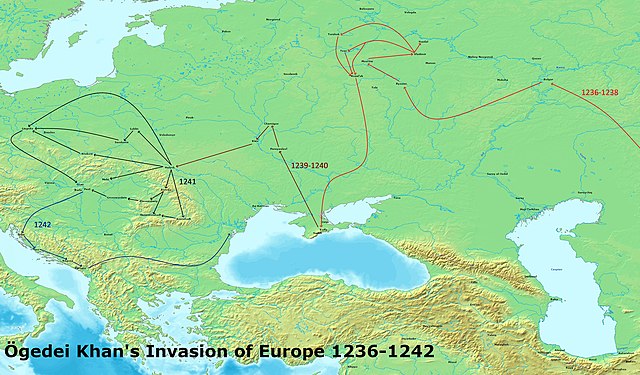The Tver Uprising of 1327 was the first major uprising against the Golden Horde by the people of Vladimir. It was brutally suppressed by the joint efforts of the Golden Horde, Muscovy and Suzdal. At the time, Muscovy and Vladimir were involved in a rivalry for dominance, and Vladimir's total defeat effectively ended the quarter-century struggle for power. The Golden Horde later became an enemy of Muscovy, and Russia did not become free of Mongol influence until the Great stand on the Ugra river in 1480, more than a century later.
Tver Uprising of 1327
Mongol invasion of Kievan Rus'
The Mongol Empire invaded and conquered much of Kievan Rus' in the mid-13th century, sacking numerous cities including the largest such as Kiev and Chernigov. The Mongol siege and sack of Kiev in 1240 is generally held to mark the end of Kievan Rus' as a distinct, singular polity. Many other Rus' principalities and urban centres in the northwest and southwest escaped destruction or suffered little to no damage from the Mongol invasion, including Galicia-Volhynia, Novgorod, Pskov, Smolensk, Polotsk, Vitebsk, and probably Rostov and Uglich.
The Mongol invasion of Europe, 1236–1242
The sacking of Suzdal by Batu Khan in February 1238; miniature from the 16th-century chronicle.
Prince Michael of Chernigov was passed between fires in accordance with ancient Turco-Mongol tradition. Batu Khan ordered him to prostrate himself before the tablets of Genghis Khan. The Mongols stabbed him to death for his refusal to do obeisance to Genghis Khan's shrine.




